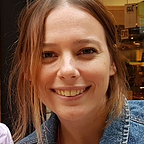What’s it like working on Yemen’s sea operations?
Behind the scenes with logistician Fatouma Omar Mohamed
31-year old Fatouma Omar Mohamad from Djibouti City first joined WFP in July 2017. Fast forward almost two years, and today she follows the sea cargo operations from Djibouti to the Yemeni ports of Aden and Hodeidah, a role that is critical to ensure lifesaving assistance gets to where it needs to on a daily basis.
“My first assignment with the WFP-led Logistics Cluster was to manage the bookings of the passengers travelling back and forth between Djibouti and Aden on the same vessel that also transports the cargo. Little by little, my supervisors started to give me more responsibilities and trained me to manage the cargo transport requests, in terms of both online tracking and hands-on logistics operations,” she says.
From memorable moments, to balancing life, work and family, we speak with Fatouma on her time on the Logistics Cluster’s Yemen operation.
Every day you work together with a community of humanitarians on one of the world’s largest response efforts — that must make you very proud. What made you decide to shift into the sector?
I am very proud and glad to be working with the Logistics Cluster. I wanted to join WFP because I was attracted by the key role it plays in providing humanitarian assistance. Working with the cluster is both interesting and motivating because we support the entire humanitarian community.
Each day I’m part of a dedicated team that makes sure lifesaving aid can reach people across Yemen. My family and friends are very happy to see my work, and that I am a valued member of the team.
What is your current position?
I am a logistician. Every day I work with WFP colleagues, humanitarian partners and clearing agents in Djibouti and Yemen, to ensure that relief items can be shipped to Yemen safely and quickly. We send all sorts of cargo from vehicles and medicines to non-food items, generators, and food.
Shipments to Aden happen on an almost weekly basis, so I’m often at the port during the weekends with other WFP staff to ensure that loading is done properly and on time.
How do you balance life and work?
Like many of my colleagues, I have a family. I manage to balance my personal and work life by giving 100 per cent at the office, so that I can spend time with my family as well. Of course, given the level of emergency response in Yemen I often have to work during weekends, but my family is very understating and supportive.
Your role with WFP is surely an inspiration to many women. How did you beat the stereotype?
I hope that more and more women will decide to work in logistics. It can be very tough, but at the same time it is extremely rewarding.
Every time I see the shipments sailing towards Yemen, I have the feeling that I’ve accomplished something important: helping humanitarian organisations in their mission of helping the people who need it.
Overall, I was very lucky to join a team that valued me and gave me the opportunity to grow professionally.
Do you have any encouraging words for those who wishing to break into the field?
Don’t be afraid to become a humanitarian! It can be challenging at stressful at times, but I cannot think of another job that would motivate me as much as this one.
Do you have a memorable moment from the Yemen operation?
I very clearly remember the day that we loaded WHO ambulances on our dear vessel VOS Apollo. It was a very long and hot day at the port, in July 2017. Yemen was in the middle of the cholera outbreak, so ambulances were urgently needed.
It was the first time I saw the Logistics Cluster and WFP in action, and how crucial the work that we do is.
What makes you get up and go to work?
Never forgetting why I chose to do this job, which is to help people in need. This is my priority each and every day.
This post was originally published on the Logistics Cluster blog.
